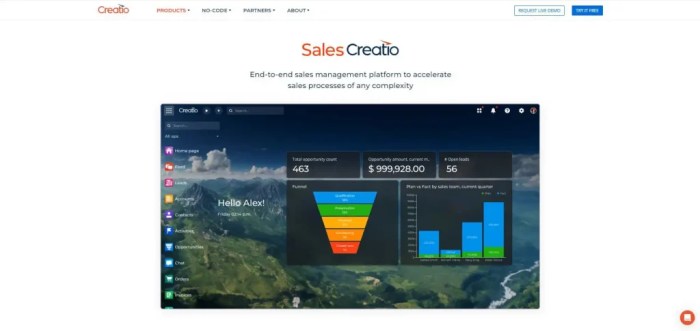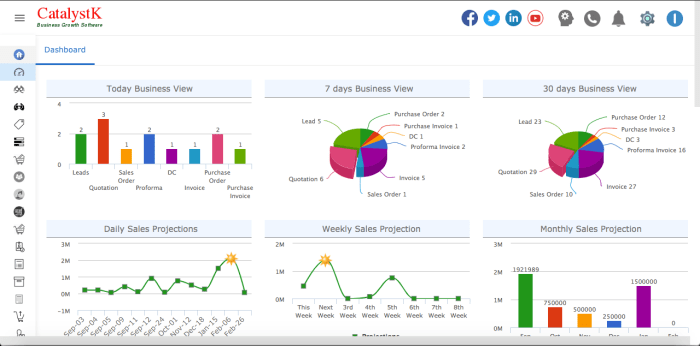In today’s competitive business landscape, effective lead management is paramount to success. A robust Customer Relationship Management (CRM) system with powerful lead management capabilities is no longer a luxury but a necessity. This comprehensive guide explores the best CRM lead management software options available, helping you choose the perfect solution to streamline your sales process, nurture leads, and ultimately boost your bottom line.
We’ll delve into key features, pricing models, and considerations to help you make an informed decision.
Understanding CRM Lead Management Software
CRM lead management software is a specialized tool designed to capture, qualify, nurture, and convert leads into paying customers. It integrates various functionalities to automate repetitive tasks, improve team collaboration, and provide valuable insights into lead behavior. Key features typically include:
- Lead Capture and Tracking: Automatically capturing leads from various sources like website forms, social media, and email marketing campaigns.
- Lead Scoring and Qualification: Assigning scores to leads based on predefined criteria (e.g., demographics, engagement level) to prioritize high-potential prospects.
- Lead Nurturing: Automating personalized communication with leads through email sequences, targeted content, and other engagement strategies.
- Sales Pipeline Management: Visualizing the sales process, tracking lead progress through each stage, and identifying bottlenecks.
- Reporting and Analytics: Generating reports on key metrics like lead conversion rates, sales cycle length, and ROI of marketing campaigns.
- Team Collaboration: Facilitating seamless communication and collaboration among sales and marketing teams.
- Integration with other tools: Seamlessly connecting with other business applications like marketing automation platforms, email marketing services, and communication tools.
Top CRM Lead Management Software Options
The market offers a wide array of CRM lead management software, each with its own strengths and weaknesses. Here are some of the leading contenders, categorized for easier comparison:
A. Enterprise-Level Solutions
- Salesforce Sales Cloud: A highly customizable and scalable solution ideal for large enterprises. Offers advanced features like AI-powered lead scoring, robust analytics, and extensive integration capabilities. However, it can be expensive and complex to implement.
- Microsoft Dynamics 365: Another powerful enterprise-grade CRM with strong lead management features. Integrates well with other Microsoft products and offers a user-friendly interface. Pricing can be substantial depending on the chosen modules and features.
- Oracle Siebel CRM: A mature and robust solution often used by large organizations with complex sales processes. Known for its comprehensive functionality and strong reporting capabilities but requires significant investment and expertise.
B. Mid-Market Solutions, Best crm lead management software
- HubSpot CRM: A popular choice for mid-sized businesses, offering a freemium model with a generous free plan and affordable paid options. Known for its user-friendly interface, robust marketing automation features, and strong lead nurturing capabilities.
- Zoho CRM: A comprehensive and affordable CRM solution with a wide range of features, including lead management, sales automation, and customer support. Offers various pricing plans to suit different business needs.
- Pipedrive: A sales-focused CRM that excels in pipeline management and sales forecasting. Its intuitive interface and straightforward approach make it easy to learn and use, even for non-technical users.
C. Small Business Solutions
- Freshsales: A user-friendly and affordable CRM designed for small businesses. Offers a good balance of features and simplicity, making it easy to manage leads and track sales progress.
- Agile CRM: A versatile and affordable option with a focus on automation and integration. Offers a wide range of features, including email marketing, social media management, and lead scoring.
- Insightly: A cloud-based CRM that is simple to use and offers a good range of features for small businesses. It’s known for its project management capabilities in addition to lead management.
Choosing the Right CRM Lead Management Software
Selecting the best CRM lead management software depends on several factors:

Source: refrens.com
- Business size and needs: Enterprise-level solutions are best suited for large organizations with complex sales processes, while smaller businesses might find simpler, more affordable options sufficient.
- Budget: Pricing models vary widely, from freemium options to expensive enterprise-level solutions. Consider your budget and the return on investment (ROI) you expect from the software.
- Features and functionalities: Identify the essential features you need, such as lead scoring, lead nurturing, sales pipeline management, and reporting. Choose a solution that offers these features and integrates with your existing tools.
- Ease of use and user interface: Opt for a user-friendly interface that is easy to learn and use for your team. Consider user reviews and testimonials to gauge the user experience.
- Integration capabilities: Ensure the CRM integrates seamlessly with your existing marketing automation, email marketing, and other business applications.
- Scalability: Choose a solution that can grow with your business. Consider future needs and ensure the CRM can handle increased data volume and user accounts.
- Customer support: Look for a provider that offers reliable customer support through various channels, such as phone, email, and chat.
Frequently Asked Questions (FAQ): Best Crm Lead Management Software
- Q: What is the difference between CRM and lead management software? A: While all good CRM systems
-include* lead management, lead management software focuses specifically on the process of capturing, qualifying, and nurturing leads. A CRM is broader, encompassing customer relationship management across the entire customer lifecycle. - Q: How much does CRM lead management software cost? A: Prices vary greatly depending on the vendor, features, and number of users. You can find free options, affordable plans for small businesses, and enterprise-level solutions with significant costs.
- Q: How can I choose the right CRM for my business? A: Consider your business size, budget, required features, ease of use, integration needs, scalability, and customer support when making your decision. Try free trials or demos whenever possible.
- Q: What are the key performance indicators (KPIs) for lead management? A: Key KPIs include lead conversion rate, sales cycle length, cost per acquisition (CPA), customer lifetime value (CLTV), and lead response time.
- Q: How can I improve my lead management process? A: Focus on lead scoring, lead nurturing, efficient communication, consistent follow-up, and data-driven decision-making.
Resources
Call to Action
Ready to optimize your lead management and boost your sales? Explore the CRM options discussed above and choose the solution that best fits your business needs. Start your free trial today and experience the power of efficient lead management!

Source: catalystk.com
Detailed FAQs
What is lead scoring, and why is it important?
Lead scoring assigns a numerical value to each lead based on predefined criteria (e.g., demographics, engagement level). This helps prioritize high-potential leads, ensuring sales efforts are focused on the most promising prospects.
How can a CRM improve team collaboration?
CRMs provide a centralized platform for sharing lead information, communication history, and sales activities, fostering better collaboration and preventing duplicated efforts among sales team members.
What are the common integration options for CRM systems?
Many CRMs integrate with marketing automation tools, email platforms, social media, and other business applications to streamline workflows and data exchange.
What are the typical costs associated with CRM software?
CRM pricing varies significantly depending on the vendor, features, and number of users. Options range from affordable cloud-based solutions to more expensive enterprise-level systems with extensive customization.
